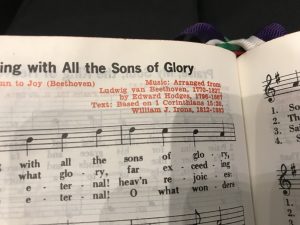Each day Franciscan Friars gather in a community to pray the “Liturgy of the Hours” in addition to the daily celebration of the Eucharist, and our personal private prayer time. The Liturgy of the Hours is an official prayer of the Church. It consists of songs, recitation of psalms (with alternating sides of the chapel taking turns speaking and listening as shown in the above photo), other scripture readings and prayers for the Church and world. The instructions for the Liturgy of the Hours designate seven times during the day for prayer. The Franciscans pray the Liturgy of the Hours each day in community at least twice (usually morning and evening). Some friaries will choose to pray in community three times, by adding either midday prayer, night prayer, or Office of Readings, to the common schedule. Friars are obligated to pray in private the other “hours” so that a total of five of the seven hours are said each day. (Monastic orders typically observe all seven hours.)
The history of this prayer goes back as far as 1280 BC (see Ex 29:38-39) where priests offered morning and evening sacrifice. The psalms were substituted for the sacrifice during the Babylonian Exile (587-521 BC) when there was no longer a temple to offer sacrifice, and that form of prayer has continued since. We see the Early Christian Church observing the practice of praying the “Third” and “Ninth Hour”. (In Acts 2:42-47, Peter speaks to crowd that had assembled for daily prayer at the 3rd hour or 9AM. In Acts 3:1 Peter and John were going up to the Temple to pray at the 9th hour, or 6PM.) The form of the prayer we use today was most significantly shaped by St. Benedict around 550 A.D., as he set up a system to cycle through the recitation of all 150 psalms each week. Later, St. Francis and the early Franciscans formed what is known today as “The breviary”, which is a shorter version of the prayers, so that the itinerant Friars could carry a smaller book to allow them to pray the Liturgy of the Hours as they went from town to town, outside of a monastery.
The Liturgy of the Hours is the prayer of the whole church, as such, it is prayed at various hours throughout the day, and throughout the world, the Church is Praying “At all times,” or “Without ceasing,” as St. Paul’s recommendation in 1 Thes 5:17. The Church is therefore in constant prayer for the salvation of all! Since Christ Himself prayed these prayers, especially the psalms, we the Body of Christ, continue to offer His prayer for the Church and world.

The style of reciting the psalms with one side of the chapel speaking while the other side listens, then reversing with each stanza of the psalm, was developed so that as monks and friars sang the words, one side could (perhaps like Martha) be busy about focusing on singing well, while the other side (perhaps like Mary) could focus on listening, loving, and worshiping God through the prayer! The taking turns doing each, allows the community to serve one another. Finally, in addition to the prescribed prayers, the friars pause and allow each friar to raise up any special intentions for that day. This becomes a beautiful way that we can fulfill the requests of many people throughout the day asking the friars to pray for their needs.
It has always been important to pray for the salvation of all. Mary especially in modern times reminds us of the need to pray for the salvation of all. These days, with increasing denial of the existence of God, sin, violence, injustice, and natural disasters, we especially need to pray for the Church and the world. That is one of the important ministries of all Christians. We Franciscans take this “work” seriously. In community, and in private, each day, we pray for you, and the whole world! To God be the Glory!
Learn more about the Liturgy of the Hours here. Join us on our next Franciscan Come and See event, November 24-26, 2017, in Castro Valley, CA, to learn more about Franciscan Life. For more information go to Upcoming Events. Peace and All Good!